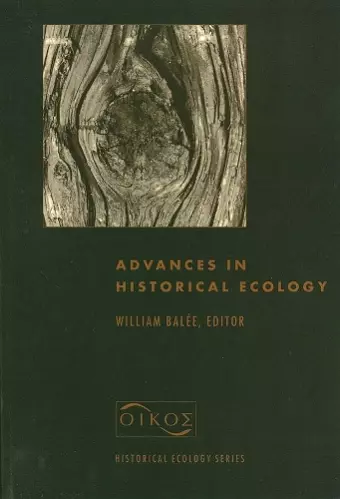Advances in Historical Ecology
Format:Paperback
Publisher:Columbia University Press
Published:6th Dec '02
Currently unavailable, and unfortunately no date known when it will be back

Bridging the divide between social and natural sciences, the contributors to this book use a holistic perspective to explore the relationships between humans and their environment. Exploring short- and long-term local and global change, eighteen specialists in anthropology, geography, history, ethnobiology, and related disciplines present new perspectives on historical ecology. The contributors focus on traditional societies where lands are most at risk from the incursions of complex, state-level societies.
Bridging the divide between social and natural sciences, this text uses a holistic perspective to explore the relationships between humans and their environment. The contributors focus on traditional societies where lands are most at risk from the incursions of complex, state-level societies.Ecology is an attempt to understand the reciprocal relationship between living and nonliving elements of the earth. For years, however, the discipline either neglected the human element entirely or presumed its effect on natural ecosystems to be invariably negative. Among social scientists, notably in geography and anthropology, efforts to address this human-environment interaction have been criticized as deterministic and mechanistic. Bridging the divide between social and natural sciences, the contributors to this book use a more holistic perspective to explore the relationships between humans and their environment. Exploring short- and long-term local and global change, eighteen specialists in anthropology, geography, history, ethnobiology, and related disciplines present new perspectives on historical ecology. A broad theoretical background on the material factors central to the field is presented, such as anthropogenic fire, soils, and pathogens. A series of regional applications of this knowledge base investigates landscape transformations over time in South America, the Mississippi Delta, the Great Basin, Thailand, and India. The contributors focus on traditional societies where lands are most at risk from the incursions of complex, state-level societies. This book lays the groundwork for a more meaningful understanding of humankind's interaction with its biosphere. Scholars and environmental policymakers alike will appreciate this new critical vocabulary for grasping biocultural phenomena.
I found this book quite fascinating; it will appeal to advanced undergraduates and the research communities of geography, ecology, anthropology, and history. -- A.M. Mannion Journal of Ecology This is an important and impressive collection. -- Stephen Nugent Antiquity Will help to encourage a greater interest in this important field. Southeastern Naturalist, Issue 2/1, 2003 Advances in Historical Ecology is an important and impressive collection of papers that seeks to widen the debate on the meaning of human-environment relationships, primarily by attempting to provide a common framework that integrates the social and physical sciences. -- Ian A. Simpson The Holocene
ISBN: 9780231106337
Dimensions: unknown
Weight: unknown
448 pages